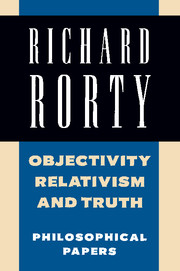Introduction: Antirepresentationalism, ethnocentrism, and liberalism
Published online by Cambridge University Press: 05 June 2012
Summary
This is the first volume of a collection of papers written between 1980 and 1989. The papers in this volume take up, for the most part, issues and figures within analytic philosophy. Those in the second volume deal mostly with issues arising out of the work of Heidegger, Derrida, and Foucault.
The six papers that form Part I of this volume offer an antirepresentationalist account of the relation between natural science and the rest of culture. By an antirepresentationalist account I mean one which does not view knowledge as a matter of getting reality right, but rather as a matter of acquiring habits of action for coping with reality. These papers argue that such an account makes it unnecessary to draw Dilthey-like distinctions between explaining “hard” phenomena and interpreting “soft” ones. They offer an account of inquiry which recognizes sociological, but not epistemological, differences between such disciplinary matrices as theoretical physics and literary criticism.
The antirepresentationalism I advocate here harks back to my 1979 book, Philosophy and the Mirror of Nature. Although the figures looming in the background of that book were Wittgenstein, Heidegger, and Dewey, my most proximate intellectual debts at the time I was writing it were to Wilfrid Sellars and Willard van Orman Quine. In the subsequent ten years, I have come to think of Donald Davidson's work as deepening and extending the lines of thought traced by Sellars and Quine.
- Type
- Chapter
- Information
- Objectivity, Relativism, and TruthPhilosophical Papers, pp. 1 - 18Publisher: Cambridge University PressPrint publication year: 1990
- 7
- Cited by



